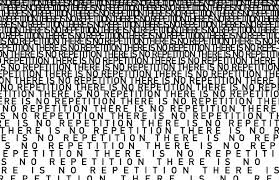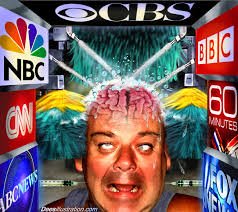I need you to need my neediness............... Just …. because.....you neeeeeeed to...
George Orwell described how and why the control, manipulation and restriction of language in a population affects the ability of individuals to not only communicate their desires and feelings, but to restrict the initiation and formulation of ideas and the communication thereof.
i.e. Limiting the diversity and subtlety of meanings of words and their combinations makes it harder to think!!

Of course people are always trying to affect the ideas of everyone they communicate with. The method used by peaceful people is usually persuasion. However, even here, it is common to find language being stretched and squeezed somewhat, in ways that will hopefully be found persuasive enough to the listener, that it results in some idea being mutually agreed upon.
It could be the sales pitch from the used car salesman

or it may be some girlfriends trying to agree on which dance club to attend on a Friday night.

“Normal” people usually attempt persuasion by presenting arguments, constructed and supported by using logic, reason and evidence.

So-called thought controllers appeal to other facets of human character, usually the emotional side of our character.
Fear... envy... hate... anger... are emotional states that can be useful to them if certain concepts and ideas can be anchored to those emotional states.
(They rarely adopt logical arguments. That's too risky, since their ideas could never stand up to the rigours of logical argumentation)

Propaganda seems to be the general method used to carry out this emotional anchoring. Propaganda is a general term used to include a range of techniques that may be employed in order to achieve the desired effect in the target audience.

Some examples of propaganda techniques............
Exaggeration - "Make the lie big, make it simple, keep saying it, and eventually they will believe it." - Adolf Hitler

1: Bandwagon - This technique tries to persuade everyone to join in and do the same thing.

2: Testimonial - An important person or famous figure endorses a product or idea.

3: Transfer - Good feelings, looks, or ideas transferred to the person for whom the product or idea is intended.

4: Repetition - The product name or keyword or phrase is repeated several times.

5: Emotional Words - Words such as luxury, beautiful, paradise, and economical are used to evoke positive feelings in the viewer.

6: Name-calling - Negative words are used to create an unfavourable opinion of the competition or dissenters, in the minds of the audience.
7: Faulty Cause and Effect - Use of a product or political idea is credited for creating a positive result.

8: Compare and Contrast - The audience is led to believe one political ideal is better than another, although no real proof is offered

(List of techniques from aacps.org)
The mass media's spewing of political propaganda in all its forms, can be a powerful tool, to those that control it, and is used to restrict and manipulate ideas.
It has undeniably achieved great progress towards the goal of mass thought control over large sections of the population.

When speaking with friends about some particular subject, our choice of language is determined to some extent, where, and by whom we were introduced to that subject. i.e. When discussing a subject we are learning about in school, it's likely that we'll use the same terms and phrases that the lecturer used when teaching the subject.
Likewise if are introduced to some news via mainstream media, we'll adopt the same terms they reporter used in his reporting. Unless we decide to research the subject in greater depth, we'll likely just continue to use the same terminology when referring to the subject.
One result of this use of selected language, is that, we all use words and phrases at least from time to time without really thinking too deeply about what the words have come to actually mean, or why we use those words and phrases, repeatedly in certain contexts......
An example of which might be – at least familiar to readers of this essay - the term “conspiracy theory.”
Around the time of the killing of JFK in Dallas Texas in Nov 1963, the term “conspiracy theory” seems to have been introduced by the media -possibly via CIA or some other alphabet coven - (supposedly as a kind of shorthand, to describe those who expressed some doubt about the official story of the JFK assassination). It was taken by the CIA, and its meaning deliberately manipulated, so that it, (along with the phrase “conspiracy theorist”) eventually became a pejorative term.
The moulding of this term, and anchoring, with the now familiar negative connotations was achieved over a period of time, via the CIA-controlled mass media organisations. The propaganda techniques of “repetition” and “ridicule” were employed when describing people (conspiracy theorists), who expressed scepticism, doubts, suspicion or made claims of the distortion of “facts” of the JFK case in Dallas.
Readers may wish to do some research on CIA “operation mocking bird” for more information on how the control of mass media was and is carried out up to the present day.
The term “conspiracy theory” has now become a propaganda tool, with which, political dissenters and sceptics can be “clubbed over the head” and verbally subdued, or at least the form or flow of their argument can be disrupted during conversation.
It is a term employed by government apologists and statists, to compose ad-hominem attacks on opponents during debate, who would otherwise threaten the efficacy of the mass delusion of the benevolent character of government in general.
e.g. The idea is that, while the word “conspiracy” merely means the planning of some activity, made by two or more people to be carried out sometime in the future. It may be made in secret...... or not. It's basically just a plan to cooperate to achieve some goal.
While everyone very often – in their daily lives - conspires with another party to combine their complimentary resources in order to achieve some end, the word was taken and consistently, and ridiculously associated with so-called (vaguely defined) “dark forces” or “secret societies” in the state-controlled mass media.
Conspriracy
When used in association with the word “theory or theorist” the result is, an attack on the credibility, of the person or group being labelled conspiracy theorist(s). The perceived plausibility, of any future argument put forward by that opponent on any matter is therefore damaged. Basically a foundation for a character assassination has been created.

Since many of us probably think that the word “guess” would adequately serve as a suitable synonym for “theory”, we effectively internally translate “conspiracy theorist” as someone who imagines or guesses that secret societies, aliens, or people from dark government agencies are in the business of “coming to get them.”
Once that image of the half-crazed, slightly deranged loon, has been planted, we can safely, without further regard to any threat to the plenitude of our intellectual integrity or sense of fair play, dismiss out-of-hand or ignore any further ramblings from him.
End Result – One fewer source of ideas with which we choose to interact. (Worse. We are convinced that it was our free choice - arrived at via our rational thought process, that led us to the decision to sever communications between us and this other person).
For the thought controllers? - Mission Accomplished!!
Needs and Neediness
As mentioned above, this particular example of the distorting and manipulation of language is fairly well known and understood by those somewhat familiar with the idea of “Orwellian Newspeak.”
However, there is another example, much more pervasive and in some respects much more dangerous to individual freedom of thought (and deed).
The (mis)use of the word "need"...... especially within political discussion or when confronted by bureaucrats and the like...
I'll try to describe and demonstrate some of the danger posed by certain speech patterns involving the common use of this word.
The negative effect, on the process of rational thought, is proportional, both, to the frequency of usage of the word, and ignorance of context.
The claim is that the word need is “over-used and mis-used” by most of us nowadays.
Like a lot of nice things, the misuse of the word "need" seems to have grown first in america and from there, spread around the english-speaking world. Y'know, just like coca-cola and hamburgers and cabbage-patch dolls....
Why has the frequency of use and misuse grown in the recent few decades?....
With the availability of high tech communication methods to the average joe nowadays, it's likely that we all receive an increasing number of messages and requests for our personal attention, daily.
For many people it can be more difficult to be heard or noticed in amongst the increased comms traffic...
It's probably more common for us to feel more highly stressed from increased pressures at work or from financial problems (..at least exacerbated by the actions of central bankers and their cronies, blowing financial bubbles around the world in their continuous programme of fleecing the sheep on an ever escalating scale of intensity...).
People in society in general are becoming more fearful for their personal security (...no doubt, contributed to, by the manufacture of ever growing numbers of boogie-men, being continually stuffed under our beds by the politicians and their handlers....)
One effect of these stresses, is to demand (more) attention from others. (Perhaps looking for sympathy or empathy or comforting or reassurance etc etc)
This is where we may find the traditionally everyday language inadequate for purpose. (Of course we are aware that language evolves in society to facilitate better communication............ well, usually)
The words want and need are common enough words, and their meanings seem similar in some ways.
When making a request of someone, it used to be sufficient to just tell them that you wanted something. It's normal to have wants. We all have wants. It does no harm to just say we want something, without explaining why we want it.
It can be harmful to accept that someone needs something without an explanation or a qualifier. - i.e. why it is needed, or what are the consequences if it is not received.. etc.
Ask someone, what is the difference between a “want” and a “need.”
You'll probably get a response, along the lines of,... “want is less important than a need” or “a want is a selfish thing, whereas a need is necessary”.....
At some level, most people seem to believe that a need is somehow more important, and we should pay more attention to (or give priority to) – a need.
But....
A “want” is a desire we may have, to help to achieve an end.
A “need” is a desire we may have, to help to achieve an end.
So, what's the difference?...

The difference is that when we use “want,” it's not obligatory to express what the desired “end” may be. Indeed, the end may be achieved in some other way if that particular “want” is not immediately satisfied.
(This is because we are aware that people always have more than one want at any particular time, and they are arranged on an vertical scale of value, inside the head of the wanter. Priorities are always changing, therefore it is understood that this want is a subjective valuation and sits somewhere on a scale of priority alongside other wants inside the head of the wanter)
On the other hand, when the word need is used, it is an imperative. i.e. the desired end can not be achieved unless the need is fulfilled. Actually in the “imperative mood” in english, need has the tone of an order.
The implication is that the desired end has high priority, and can only be achieved one way, and that is, if the need is met.
So, where's the problem?
Well, when people express a “need” without a qualifier, or an explanation of why it is needed, it is equivalent to them saying that, this must be.

The implication is that their need is objectively infinitely important............ which, of course is utter bullshit.
They are claiming that their end is of infinite objective value. If you accept his claim, then you are obliged to give your own subjective values a lower status than their claim.
Now, that is bad enough when dealing with friends or family......
Many people will claim that, for example, living healthily is infinitely important to them. But that is demonstrably rubbish. If they actually believed that, then they wouldn't smoke or drink coffee, alcohol. They would never get in a car, or eat cakes, or indulge in any activity that carries any small risk to their life expectancy. To do so is to falsify their claim that health is of paramount importance.
With this in mind, common phrases like..”...I need you to listen to me..” and “...you need to do this..” or, “...you need to learn to drive..” are all examples of someone whining at you to listen to them, above all else that is going on around you.

But, it's more than this. As long as we accept this as a legitimate use of the word need the result is that we are allowing other people to determine our needs objectively. ( A need is certainly not objective).
If we allow other people to determine what is valuable to us, then we are certainly not free to decide what is valuable to us. The result is that we are not free, at all.
Freedom is about making our own decisions and choices, based on our own subjective values.
Statists and the tools of the state, dressed in fancy costumes, have certainly been trained to use this kind of language when addressing the proletariat.
When the useful-idiotic over-zealous bureaucrat is addressing joe public, with language like,... “You need to listen to me...” or the greasy dough-bag TSA agent shouts......
 “You need to stand behind the yellow line...!!” or other such nonsense, there is rarely a qualifier offered.
“You need to stand behind the yellow line...!!” or other such nonsense, there is rarely a qualifier offered.
Oh! For sure there are consequences if you choose not to “obey.” The message is, that you're being told what is important to both you, and to them, and, that it is of infinite importance.

There is always a choice...... but, here, we are being told that there is no choice.
At the very least, whenever someone tells you that something is needed, ask them to qualify why it is needed. Once a reason has been given, then you can make a value judgement for yourself of how important it is. …..................
(Don't expect much of a sensible answer to your question from a useful idiot of the state. It's unlikely that they have been programmed with reasoned responses).
When an unqualified or unsupported need is claimed in normal daily conversation, it is usually just a whine. “....Pay attention to me, me, me, me....”
When used by a tool of the state, it is an attempt by them to define your reality. They live in a certain reality, and they intend to make you live in it as well.
Don't underestimate how desperate they are to make you accept their reality. By their very job description, they really do not like the idea of you being free, in thought or deed. (They find it frightening.... but that's another story..)



Congratulations @kak! You have received a personal award!
Click on the badge to view your own Board of Honor on SteemitBoard.
For more information about this award, click here